北师大版(2019)选择性必修第一册Unit 3 Conservation Lesson 3 The Road To Destruction 课件 (共37张PPT)
文档属性
| 名称 | 北师大版(2019)选择性必修第一册Unit 3 Conservation Lesson 3 The Road To Destruction 课件 (共37张PPT) | 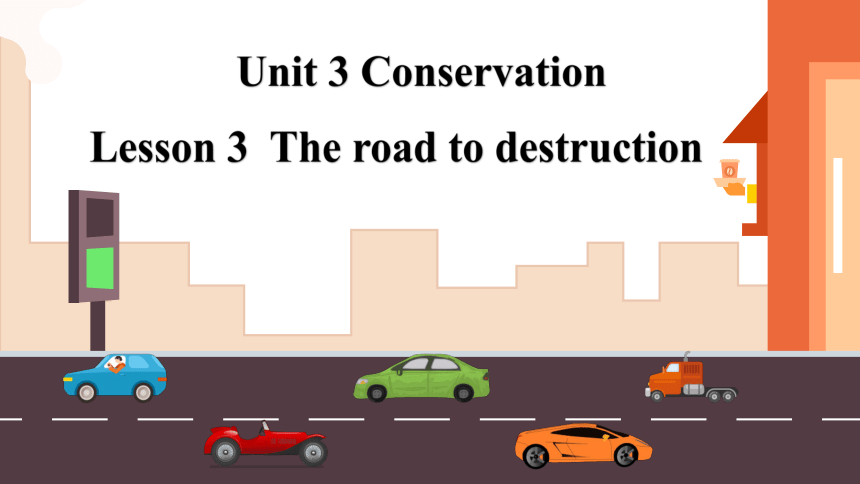 | |
| 格式 | pptx | ||
| 文件大小 | 45.9MB | ||
| 资源类型 | 教案 | ||
| 版本资源 | 北师大版(2019) | ||
| 科目 | 英语 | ||
| 更新时间 | 2023-12-17 21:16:31 | ||
图片预览

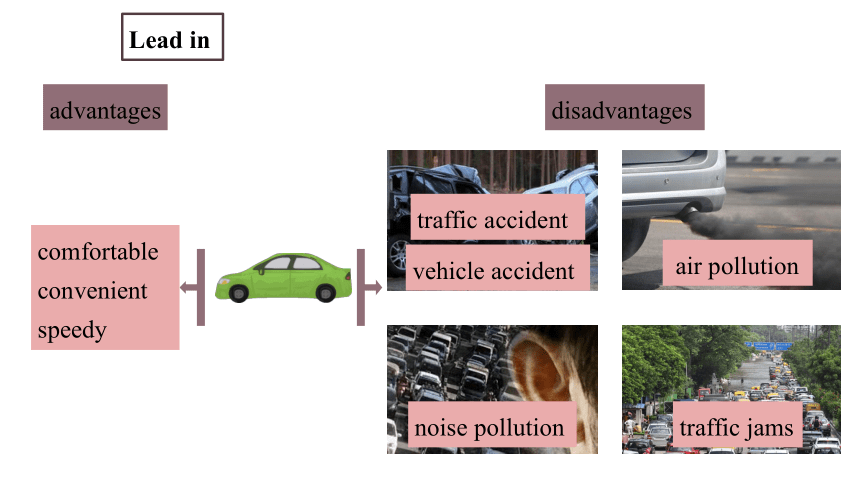

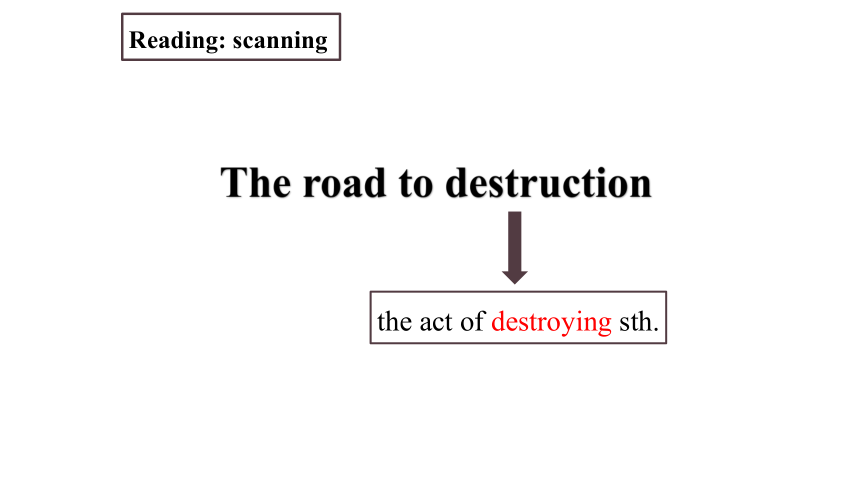

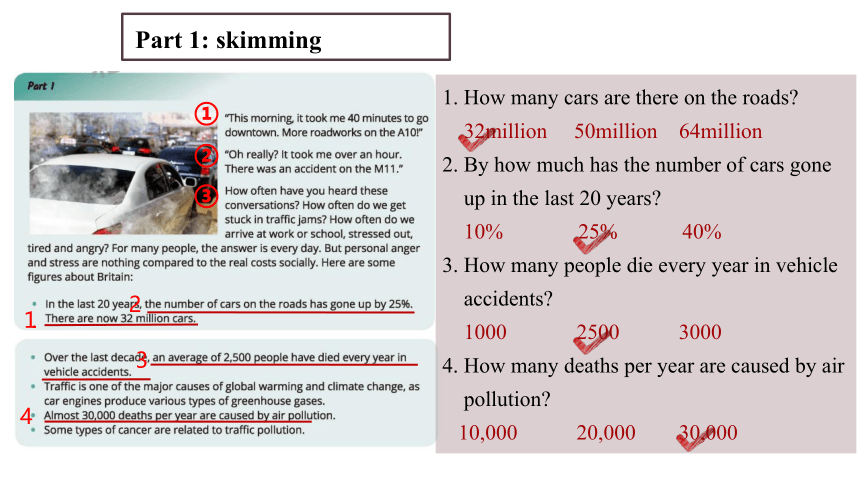

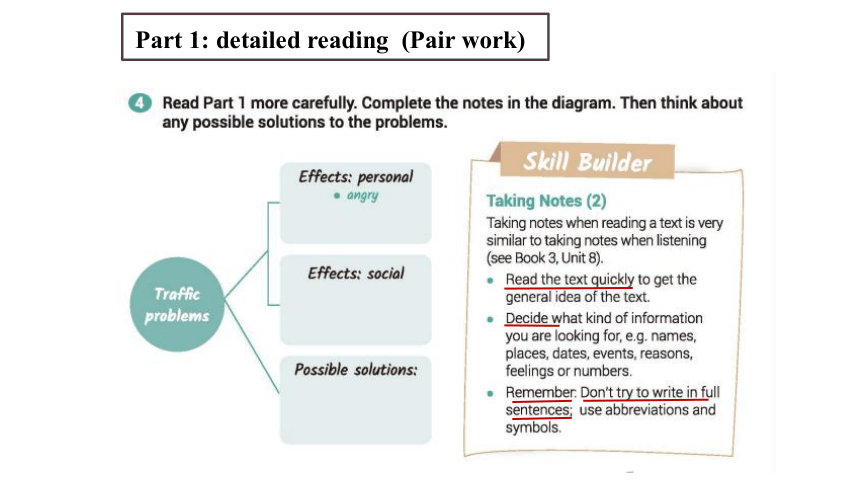
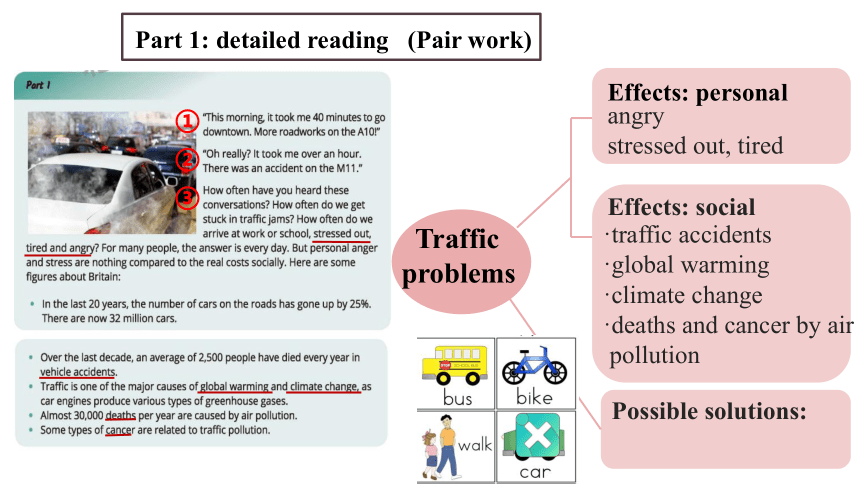
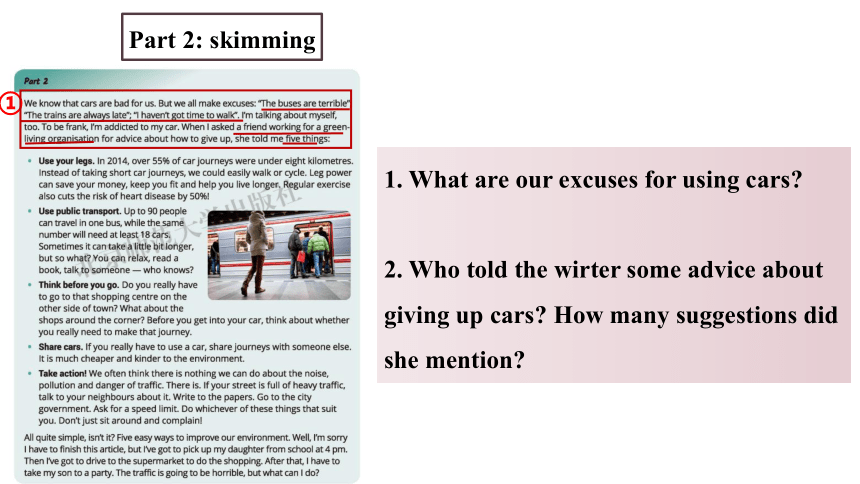
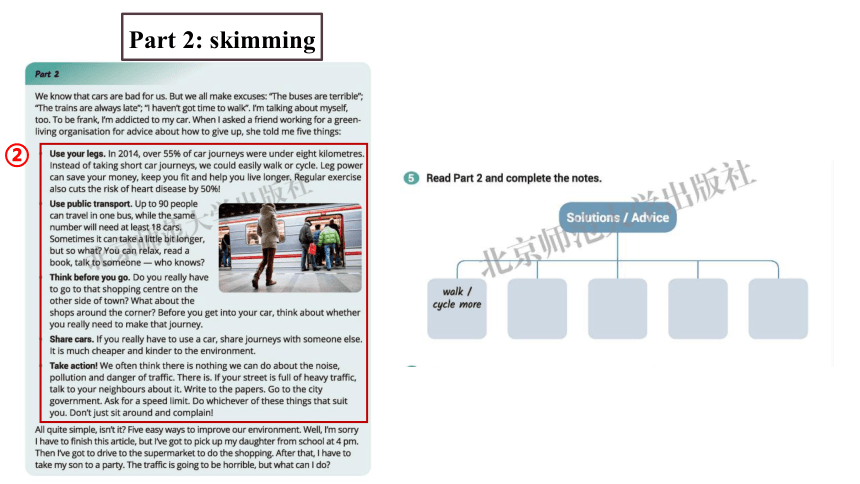
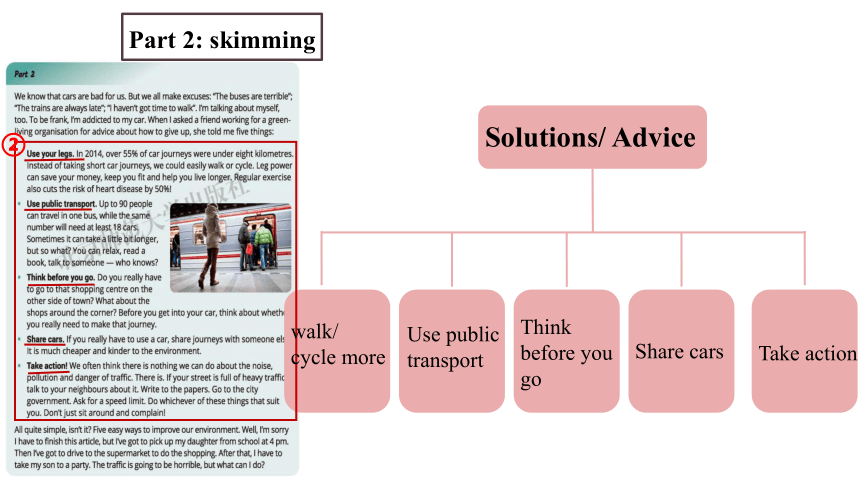
文档简介
(共37张PPT)
Lesson 3 The road to destruction
Unit 3 Conservation
Lead in
advantages
comfortable
convenient
speedy
disadvantages
traffic accident
air pollution
noise pollution
traffic jams
vehicle accident
You will feel
anxious
annoyed
stressed out
tired
angry
helpless
Pre-reading
How do you feel when you get stuck in traffic jams
I will feel__________ when I get stuck in traffic jams.
The road to destruction
Reading: scanning
the act of destroying sth.
Reading: scanning
What is the text type of the passage
A. Narration (记叙文).
B. Argumentative Essay (议论文).
C. Expository Writing (说明文).
D. News Report (新闻报道).
①
②
③
Part 1: skimming
⒈
2
3
4
1. How many cars are there on the roads
32million 50million 64million
2. By how much has the number of cars gone
up in the last 20 years
10% 25% 40%
3. How many people die every year in vehicle
accidents
1000 2500 3000
4. How many deaths per year are caused by air
pollution
10,000 20,000 30,000
①
②
③
Part 1: skimming
⒈
2
3
4
What's the main idea of part 1
A. The deaths and cancers in Britain.
B. The traffic accidents in Britain.
C. The traffic jams in Britain.
D. The traffic problems in Britain.
extremely severe
Part 1: detailed reading (Pair work)
①
②
③
Traffic
problems
Effects: personal
angry
stressed out, tired
Effects: social
·traffic accidents
·global warming
·climate change
·deaths and cancer by air
pollution
Possible solutions:
Part 1: detailed reading (Pair work)
①
1. What are our excuses for using cars
2. Who told the wirter some advice about
giving up cars How many suggestions did
she mention
Part 2: skimming
②
Part 2: skimming
Solutions/ Advice
Solutions/ Advice
walk/
cycle more
Use public transport
Think
before you go
Share cars
Take action
Part 2: skimming
②
Part 2: detailed reading
Most people think there is________ they can do about the noise________ and ______of traffic. However, if we just sit_______ and complain, the things won't get better. Thus we need to take _____, use________ transport and our________.
Besides, we need to think about the __________(necessary)
of the journey before we go. If we really have to use a car, we can_______journeys with someone else, which will be _______ cheaper and kinder _____ our environment.
nothing
danger
pollution
around
action
public
legs
necessity
share
much
to
Part 2: Take Notes
Advice from a friend
Advice Advantages / reasons
Use your legs
2. Use public transport
3. Think before you go Don’t need to make that journey
4. Share cars
5. Take action Don’t just sit around and complain
Much cheaper and kinder to the environment
Save money, keep fit and help you live longer
Cut the risk of heart disease
Relax, read a book and talk to someone on the bus or train
Hold more people than cars
How do you understand the title The road to destruction
A. Too many cars destroy roads.
B. We should build enough roads to reduce traffic jams.
C. We shouldn’t use cars anymore in case of traffic problems.
D.The cars on the road will eventually lead to the destruction of our planet.
Reading
Read and Think
What are the techniques or rhetorical devices of expository writing (说明方法/修辞手法)
举例子(Giving examples)
列数据(Using data)
引观点(Quotations)
做比较(Compare, contrast)
摆事实(Presenting facts)
排比/重复(Parallel structure, repetition)
口语表达(A colloquial style)
Part 1: Pair work
What techniques can you find in part 1
1
Examples
2
Parallel structure, repetition
3
Using data
Presenting facts
Part 2: Pair work
1
Examples
What techniques can you find in part 2
2
Using data
3
Compare, contrast
4
A colloquial style
Will the solutions help solve the problem
What’s the writer’s attitude Find some evidence from the passage.
Part 2: Read and Think
Part 2: Read and Think
Will the solutions help solve the problem
What’s the writer’s attitude Find some evidence from the passage.
“How often have you heard... How often do we get... How often do we arrive... For many people, the answer is everyday.”
I think the author doesn’t like getting stuck in traffic jams, either.
Part 2: Read and Think
Will the solutions help solve the problem
What’s the writer’s attitude Find some evidence from the passage.
“We know that cars are bad for us.”
“All quite simple, isn’t it Five easy ways to improve our environment.”
She knows that cars have negative effects and she also wants to help protect the environment.
Part 2: Read and Think
Will the solutions help solve the problem
What’s the writer’s attitude Find some evidence from the passage.
“...but I’ve got to pick up my daughter from school at 4 pm. Then I’ve got to drive to the supermarket to do the shopping. After that, I have to take my son to a party.”
“The traffic is going to be horrible, but what can I do ”
But she thinks it will be difficult to give up her car. She still keeps using it.
Part 2: Read and Think
Why doesn’t she give up her car
“To be frank, I’m addicted to my car.”
Car, as part of the author’s life, plays an important role. Though it causes various negative effects, it really can bring great convenience to her.
unable to stop using or doing sth as a habit
How do you understand the title The road to destruction
Reading
How to turn “The Road to Destruction” to “The Road to Construction”?
What can you do in daily life
Group work
毁灭之路
建设之路
Make a brief poster based on what you have learnt to encourage people
in your neighbourhood to use their vehicles wisely.
Group work
Group work: summary and sharing
make a summary of the passage
share your reflection
c cars
h global warming
e up sb
b a lot of harm
f the environment
a addicted to
d in a traffic jam
g excuses
Activity 5
Look at the Word Builder. Match the words (1-8) with the endings (a-h) to form common collocations. Then use the collocations to complete the summary.
1 make
2 get stuck
3 be
4 protect
5 do
6 pick
7 cause
8 share
Word Builder
找借口
堵车
沉迷于
保护环境
有害
接某人
导致全球变暖
共享汽车
Activity 5
Look at the Word Builder. Match the words (1-8) with the endings (a-h) to form common collocations. Then use the collocations to complete the summary.
make excuses get stuck in a traffic jam be addicted to protect the environment
do a lot of harm pick up sb cause global warming share cars
Many people often 1___________________ when they go to work. How annoyed and stressful they often feel! But the problem is that the number of cars is still going up. Traffic pollution has been found to 2___________________ and climate change to a large degree.Too many cars 3_________________ to the environment and our health. Some advice has been given for people to help 4____________________, for example, using public transport or 5_________________, doing your shopping in the shop just around the corner instead of driving to the other side of town. However, people 6_________________ using cars. They 7_________________ for using their cars, “I need to 8_________________ my daughter. What can I do ”
get stuck in a traffic jam
cause global warming
do a lot of harm
protect the environment
sharing cars
are addicted to
make excuses
pick up
Word Builder
Read Part 1 of the passage. Check your predictions in Activity 2.
"This morning, it took me 40 minutes to go downtown. More roadworks on the A10!"
"Oh really It took me over an hour. There was an accident on the M11."
How often have you heard these conversations How often do we get stuck in traffic jams How often do we arrive at work or school, stressed out, tired and angry For many people, the answer is every day. But personal anger and stress are nothing compared to the real costs socially. Here are some figures about Britain:
prediction n.预测, 预言
predict v.预测, 预言
n.市区
it takes sb. sth. to do sth.
n.道路施工
n.事故
n.谈话
stuck adj.被…困住的
v.stick的过去式&过去分词
traffic jam n.堵车/ 交通阻塞
adj.做状语(此处表结果)
n.愤怒
compare v.比较;对比
cost n.成本;花费 v.需付费
过去分词做状语(表被动)
social adj.社会的
figure n.图形; 人物; 身材
v.认为;计算(figure out)
In the last 20 years, the number of cars on the roads has gone up by 25%.There are now 32 million cars.
Over the last decade, an average of 2,500 people have died every year in vehicle accidents.
Traffic is one of the major causes of global warming and climate change, as car engines produce various types of greenhouse gases.
Almost 30,000 deaths per year are caused by air pollution.
Some types of cancer are related to traffic pollution.
go up 上涨;增长
last adv.最后;最新 v.持续
n.十年
average n.平均水平; 平均数
adj.平均的
vehicle n.车辆;交通工具
major adj.主要的
minor 较小的;次要的
as prep.作为;像;
conj.随着;正如;因为
produce v.生产
produce v.生产
product n.产品
n.污染
related adj.相关的;有联系的
be related to 与…有关
related adj.相关的;有联系的
relate v. 联系
relation n.关联;联系
relative n.亲戚 adj. 相对的;相关联的
We know that cars are bad for us. But we all make excuses: "The buses are terrible"; "The trains are always late"; "I haven't got time to walk". I'm talking about myself, too. To be frank, I'm addicted to my car. When I asked Jenny Trowe of Greenpeace for advice about how to give up, she told me five things:
excuse n.借口;理由 v.原谅;宽恕
be addicted to... 沉迷于...
Use your legs. In 2014, over 55% of car journeys were under eight kilometres. Instead of taking short car journeys, we could easily walk or cycle. Leg power can save your money, keep you fit and help you live longer. Regular exercise also cuts the risk of heart disease by 50%!
journey n.旅行
trip n.旅游;绊倒 v.将…绊倒
travel n./v.旅行
regular adj.规则的;定期的
Use public transport. Up to 90 people can travel in one bus, while the same number will need at least 18 cars. Sometimes it can take a little bit longer, but so what You can relax, read a book, talk to someone - who knows
Think before you go. Do you really have to go to that shopping centre on the other side of town What about the shops around the corner Before you get into your car, think about whether you really need to make that journey.
up to 多达
而;当...
at least 至少
so what 那又怎样
side n.边
around the corner 在拐角处;即将来临
whether 是否
whether 引导的宾语从句
Share cars. If you really have to use a car, share journeys with someone else. It is much cheaper and kinder to the environment.
Take action! We often think there is nothing we can do about the noise, pollution and danger of traffic. There is. If your street is full of heavy traffic, talk to your neighbours about it. Write to the papers. Go to the city government. Ask for a speed limit. Do whichever of these things that suit you. Don't just sit around and complain!
that
噪音
污染
交通拥挤
paper n.论文;报纸;纸
ask for 请求;要求
suit v.适合 n.诉讼;套装
whichever 无论哪一个
wherever 无论哪里
whoever 无论谁
whenever 无论何时
v.抱怨
All quite simple, isn't it Five easy ways to improve our environment. Well, I'm sorry I have to finish this article, but l've got to pick up my daughter from school at 4 pm. Then l've got to drive to the supermarket to do the shopping. After that, I have to take my son to a party. The traffic is going to be horrible, but what can I do
quite adv.十分
quiet adj.安静的
simple adj.简单的
simply adv.简单地; 仅仅
n.文章
pick up 捡起; 接
have got to 不得不;必须
horrible adj. 极坏的;可怕的;恐怖的
terrible adj. 令人极不快的;可怕的
Lesson 3 The road to destruction
Unit 3 Conservation
Lead in
advantages
comfortable
convenient
speedy
disadvantages
traffic accident
air pollution
noise pollution
traffic jams
vehicle accident
You will feel
anxious
annoyed
stressed out
tired
angry
helpless
Pre-reading
How do you feel when you get stuck in traffic jams
I will feel__________ when I get stuck in traffic jams.
The road to destruction
Reading: scanning
the act of destroying sth.
Reading: scanning
What is the text type of the passage
A. Narration (记叙文).
B. Argumentative Essay (议论文).
C. Expository Writing (说明文).
D. News Report (新闻报道).
①
②
③
Part 1: skimming
⒈
2
3
4
1. How many cars are there on the roads
32million 50million 64million
2. By how much has the number of cars gone
up in the last 20 years
10% 25% 40%
3. How many people die every year in vehicle
accidents
1000 2500 3000
4. How many deaths per year are caused by air
pollution
10,000 20,000 30,000
①
②
③
Part 1: skimming
⒈
2
3
4
What's the main idea of part 1
A. The deaths and cancers in Britain.
B. The traffic accidents in Britain.
C. The traffic jams in Britain.
D. The traffic problems in Britain.
extremely severe
Part 1: detailed reading (Pair work)
①
②
③
Traffic
problems
Effects: personal
angry
stressed out, tired
Effects: social
·traffic accidents
·global warming
·climate change
·deaths and cancer by air
pollution
Possible solutions:
Part 1: detailed reading (Pair work)
①
1. What are our excuses for using cars
2. Who told the wirter some advice about
giving up cars How many suggestions did
she mention
Part 2: skimming
②
Part 2: skimming
Solutions/ Advice
Solutions/ Advice
walk/
cycle more
Use public transport
Think
before you go
Share cars
Take action
Part 2: skimming
②
Part 2: detailed reading
Most people think there is________ they can do about the noise________ and ______of traffic. However, if we just sit_______ and complain, the things won't get better. Thus we need to take _____, use________ transport and our________.
Besides, we need to think about the __________(necessary)
of the journey before we go. If we really have to use a car, we can_______journeys with someone else, which will be _______ cheaper and kinder _____ our environment.
nothing
danger
pollution
around
action
public
legs
necessity
share
much
to
Part 2: Take Notes
Advice from a friend
Advice Advantages / reasons
Use your legs
2. Use public transport
3. Think before you go Don’t need to make that journey
4. Share cars
5. Take action Don’t just sit around and complain
Much cheaper and kinder to the environment
Save money, keep fit and help you live longer
Cut the risk of heart disease
Relax, read a book and talk to someone on the bus or train
Hold more people than cars
How do you understand the title The road to destruction
A. Too many cars destroy roads.
B. We should build enough roads to reduce traffic jams.
C. We shouldn’t use cars anymore in case of traffic problems.
D.The cars on the road will eventually lead to the destruction of our planet.
Reading
Read and Think
What are the techniques or rhetorical devices of expository writing (说明方法/修辞手法)
举例子(Giving examples)
列数据(Using data)
引观点(Quotations)
做比较(Compare, contrast)
摆事实(Presenting facts)
排比/重复(Parallel structure, repetition)
口语表达(A colloquial style)
Part 1: Pair work
What techniques can you find in part 1
1
Examples
2
Parallel structure, repetition
3
Using data
Presenting facts
Part 2: Pair work
1
Examples
What techniques can you find in part 2
2
Using data
3
Compare, contrast
4
A colloquial style
Will the solutions help solve the problem
What’s the writer’s attitude Find some evidence from the passage.
Part 2: Read and Think
Part 2: Read and Think
Will the solutions help solve the problem
What’s the writer’s attitude Find some evidence from the passage.
“How often have you heard... How often do we get... How often do we arrive... For many people, the answer is everyday.”
I think the author doesn’t like getting stuck in traffic jams, either.
Part 2: Read and Think
Will the solutions help solve the problem
What’s the writer’s attitude Find some evidence from the passage.
“We know that cars are bad for us.”
“All quite simple, isn’t it Five easy ways to improve our environment.”
She knows that cars have negative effects and she also wants to help protect the environment.
Part 2: Read and Think
Will the solutions help solve the problem
What’s the writer’s attitude Find some evidence from the passage.
“...but I’ve got to pick up my daughter from school at 4 pm. Then I’ve got to drive to the supermarket to do the shopping. After that, I have to take my son to a party.”
“The traffic is going to be horrible, but what can I do ”
But she thinks it will be difficult to give up her car. She still keeps using it.
Part 2: Read and Think
Why doesn’t she give up her car
“To be frank, I’m addicted to my car.”
Car, as part of the author’s life, plays an important role. Though it causes various negative effects, it really can bring great convenience to her.
unable to stop using or doing sth as a habit
How do you understand the title The road to destruction
Reading
How to turn “The Road to Destruction” to “The Road to Construction”?
What can you do in daily life
Group work
毁灭之路
建设之路
Make a brief poster based on what you have learnt to encourage people
in your neighbourhood to use their vehicles wisely.
Group work
Group work: summary and sharing
make a summary of the passage
share your reflection
c cars
h global warming
e up sb
b a lot of harm
f the environment
a addicted to
d in a traffic jam
g excuses
Activity 5
Look at the Word Builder. Match the words (1-8) with the endings (a-h) to form common collocations. Then use the collocations to complete the summary.
1 make
2 get stuck
3 be
4 protect
5 do
6 pick
7 cause
8 share
Word Builder
找借口
堵车
沉迷于
保护环境
有害
接某人
导致全球变暖
共享汽车
Activity 5
Look at the Word Builder. Match the words (1-8) with the endings (a-h) to form common collocations. Then use the collocations to complete the summary.
make excuses get stuck in a traffic jam be addicted to protect the environment
do a lot of harm pick up sb cause global warming share cars
Many people often 1___________________ when they go to work. How annoyed and stressful they often feel! But the problem is that the number of cars is still going up. Traffic pollution has been found to 2___________________ and climate change to a large degree.Too many cars 3_________________ to the environment and our health. Some advice has been given for people to help 4____________________, for example, using public transport or 5_________________, doing your shopping in the shop just around the corner instead of driving to the other side of town. However, people 6_________________ using cars. They 7_________________ for using their cars, “I need to 8_________________ my daughter. What can I do ”
get stuck in a traffic jam
cause global warming
do a lot of harm
protect the environment
sharing cars
are addicted to
make excuses
pick up
Word Builder
Read Part 1 of the passage. Check your predictions in Activity 2.
"This morning, it took me 40 minutes to go downtown. More roadworks on the A10!"
"Oh really It took me over an hour. There was an accident on the M11."
How often have you heard these conversations How often do we get stuck in traffic jams How often do we arrive at work or school, stressed out, tired and angry For many people, the answer is every day. But personal anger and stress are nothing compared to the real costs socially. Here are some figures about Britain:
prediction n.预测, 预言
predict v.预测, 预言
n.市区
it takes sb. sth. to do sth.
n.道路施工
n.事故
n.谈话
stuck adj.被…困住的
v.stick的过去式&过去分词
traffic jam n.堵车/ 交通阻塞
adj.做状语(此处表结果)
n.愤怒
compare v.比较;对比
cost n.成本;花费 v.需付费
过去分词做状语(表被动)
social adj.社会的
figure n.图形; 人物; 身材
v.认为;计算(figure out)
In the last 20 years, the number of cars on the roads has gone up by 25%.There are now 32 million cars.
Over the last decade, an average of 2,500 people have died every year in vehicle accidents.
Traffic is one of the major causes of global warming and climate change, as car engines produce various types of greenhouse gases.
Almost 30,000 deaths per year are caused by air pollution.
Some types of cancer are related to traffic pollution.
go up 上涨;增长
last adv.最后;最新 v.持续
n.十年
average n.平均水平; 平均数
adj.平均的
vehicle n.车辆;交通工具
major adj.主要的
minor 较小的;次要的
as prep.作为;像;
conj.随着;正如;因为
produce v.生产
produce v.生产
product n.产品
n.污染
related adj.相关的;有联系的
be related to 与…有关
related adj.相关的;有联系的
relate v. 联系
relation n.关联;联系
relative n.亲戚 adj. 相对的;相关联的
We know that cars are bad for us. But we all make excuses: "The buses are terrible"; "The trains are always late"; "I haven't got time to walk". I'm talking about myself, too. To be frank, I'm addicted to my car. When I asked Jenny Trowe of Greenpeace for advice about how to give up, she told me five things:
excuse n.借口;理由 v.原谅;宽恕
be addicted to... 沉迷于...
Use your legs. In 2014, over 55% of car journeys were under eight kilometres. Instead of taking short car journeys, we could easily walk or cycle. Leg power can save your money, keep you fit and help you live longer. Regular exercise also cuts the risk of heart disease by 50%!
journey n.旅行
trip n.旅游;绊倒 v.将…绊倒
travel n./v.旅行
regular adj.规则的;定期的
Use public transport. Up to 90 people can travel in one bus, while the same number will need at least 18 cars. Sometimes it can take a little bit longer, but so what You can relax, read a book, talk to someone - who knows
Think before you go. Do you really have to go to that shopping centre on the other side of town What about the shops around the corner Before you get into your car, think about whether you really need to make that journey.
up to 多达
而;当...
at least 至少
so what 那又怎样
side n.边
around the corner 在拐角处;即将来临
whether 是否
whether 引导的宾语从句
Share cars. If you really have to use a car, share journeys with someone else. It is much cheaper and kinder to the environment.
Take action! We often think there is nothing we can do about the noise, pollution and danger of traffic. There is. If your street is full of heavy traffic, talk to your neighbours about it. Write to the papers. Go to the city government. Ask for a speed limit. Do whichever of these things that suit you. Don't just sit around and complain!
that
噪音
污染
交通拥挤
paper n.论文;报纸;纸
ask for 请求;要求
suit v.适合 n.诉讼;套装
whichever 无论哪一个
wherever 无论哪里
whoever 无论谁
whenever 无论何时
v.抱怨
All quite simple, isn't it Five easy ways to improve our environment. Well, I'm sorry I have to finish this article, but l've got to pick up my daughter from school at 4 pm. Then l've got to drive to the supermarket to do the shopping. After that, I have to take my son to a party. The traffic is going to be horrible, but what can I do
quite adv.十分
quiet adj.安静的
simple adj.简单的
simply adv.简单地; 仅仅
n.文章
pick up 捡起; 接
have got to 不得不;必须
horrible adj. 极坏的;可怕的;恐怖的
terrible adj. 令人极不快的;可怕的
同课章节目录
- Unit 1 Relationshis
- Lesson 1 Teachers
- Lesson 2 How Do We Like Teachers’ Feedback?
- Lesson 3 So Close,Yet So Fa
- Unit 2 Success
- Lesson 1 Money vs Success
- Lesson 2 Top Five Secrets of Success
- Lesson 3 Getting to the Top
- Unit 3 Conservation
- Lesson 1 The Sixth Extinction
- Lesson 2 War on Plastic Packets
- Lesson 3 The Road to Destruction
